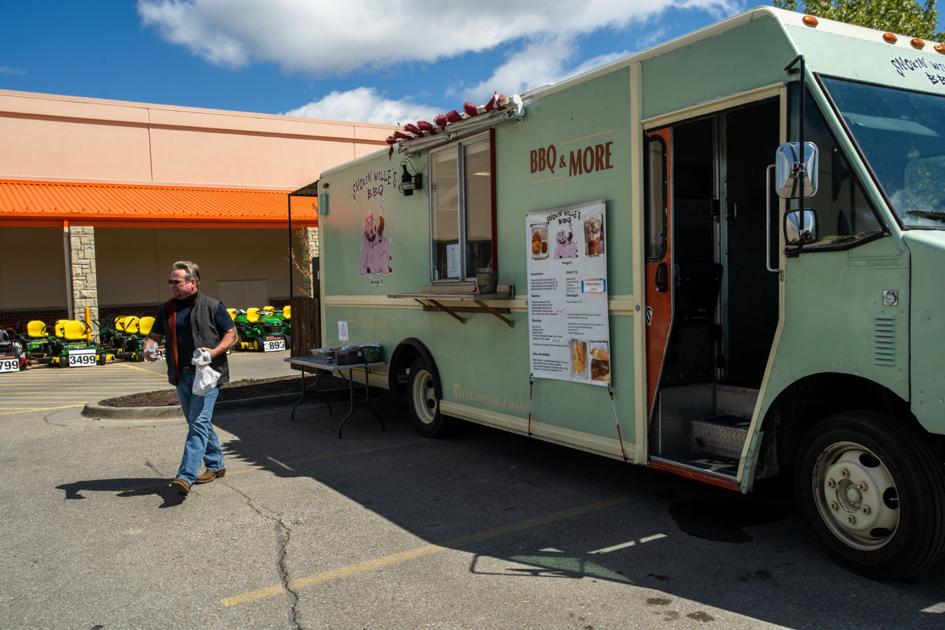
Just as soon as Karen Wille, co-owner of Smokin’ Wille’s BBQ food truck, took a customer’s order on a recent weekday while parked in the Home Depot parking lot, Lisa Leikam, an employee and longtime friend of Karen’s, worked off to the side, assembling a pulled pork sandwich and spooning macaroni and baked beans into a container.
In just a minute, Wille handed down the order, the savory and warm aroma of slow-cooked meats lingering in the air.
For some owners, food trucks have appealed to those wanting to jump into the food industry without the intimidating expenses and start up costs of traditional brick-and-mortar establishments while being able to meet customers where they are.
In the early stages of the coronavirus pandemic, it seemed food trucks were in a slightly better position to accommodate restrictions handed down by local health departments. Truck owners didn’t have to worry about managing dine-in seating, which was limited for months in Riley County, and for the most part, their concept revolves around the idea that customers can grab their orders and go.
For most, adding masks, bottling up individual sauce containers or handing out drinks instead of putting out a cooler have been some of the few and easier changes these trucks have made.
Even so, these kitchens on wheels haven’t been completely removed from the impacts of COVID-19.
Wille said the Smokin’ Wille’s truck, as well as the Wamego storefront, closed for a few weeks during the early days of the pandemic because of the uncertainty of the situation, less people eating out and to prevent her daughter from potentially catching the virus. They reopened in May, but they still aren’t operating like they were before last March.
“A lot of places we went were completely shut down, and some of them we still haven’t got back to,” Wille said.
While serving lunch throughout the week was a consistent feature of her truck’s schedule, Katie VanVleet, owner of Tasty Traveler, said working large events and festivals accounted for about 80% of her business. After those were canceled with no end in sight to the situation, VanVleet took on another job, dropping truck operations to Fridays and typically catering events on the weekends. For the near future, at least, VanVleet said she plans to continue this model.
“I think people felt comfortable (patronizing food trucks) because it was outside, and we had that layer of distance between us, so I feel like even though we did make the change to go from every weekday to just Fridays, people came out and were super supportive and kept following us,” VanVleet said. “We are having big days now that we’re just one day a week. Our overhead is pretty much all in the truck. We didn’t have a whole dining room or patio that we had to close down, so in that way we were very fortunate.”
Melissa Asper, co-owner of The DoughBro, which became fully operational in August, echoed similar thoughts. Asper said she and her husband, Steven, have discussed eventually opening a physical space for the business, but the pandemic has caused them to reflect on the volatility of doing so right now.
“You think about situations like this that come up and it’s like, ‘My gosh, look what that would have done to us had we been in a storefront,’” Asper said. “Businesses shutting down or their capacity gets cut into a third of what it used to be or whatever the instance may be. But the fortunate thing about having a food truck is the customers expect to not hang around. That’s just the expectation of the way the business is set up, just stop by and get what you need and then take it with you.”
While The DoughBro, whose name is a riff on Dobro guitars and serves bierocks, cinnamon rolls and other savory and sweet goods, is typically out in the community Wednesdays through Fridays and some Saturdays, it also has integrated delivering orders to customers on occasion and taking preorders. The truck is still fairly new, Asper said, but depending on growth, she hopes to be able to expand its delivery options and be open more often.
Wille said during the past year, their truck focused on small events in lieu of festivals, which are starting to slowly return, but nowadays they’re often out in the area throughout the week. She said they’ve been able to navigate the pandemic so far, but one issue they’ve had to deal with recently are quality problems in their food supply chain.
“Production is down, but the quality coming out is way down,” Wille said.
She said with a low number of workers returning to warehouses, product is not being rotated as often, leading to the truck having a shorter window to use items like meat or even receiving expired product, as well as product coming in with inconsistent quality. Lack of workers also has resulted in price spikes for certain foods as it becomes harder to process at the same level, and at one point, Smokin’ Wille’s had to take brisket off the menu to avoid raising its meal prices.
VanVleet said she certainly felt the impact of people making a point to support small and local businesses during the early part of the pandemic, which has been steady since then.
“They had compassion for what all the restaurants and food service were going through,” she said. “I feel like now it’s like they’re just dedicated and loyal. Now they’re like, ‘OK, where are you going to be? OK, I’ll make my plans and make sure we get there next Friday.’ We’ve had a good following from the get-go, but I just feel like it’s grown and grown.”
https://ift.tt/3t4pDkM
food

Tidak ada komentar:
Posting Komentar